In today’s fast-paced retail landscape, staying ahead means embracing technology that simplifies and enhances operations. Many retailers face the challenge of outdated cash registers and cumbersome sales tracking processes, leading to longer queues, frustrated customers, and potential loss of sales.
Imagine transforming this scenario with one of the top POS systems in the market. These systems are designed to streamline your sales process, making checkouts quick and efficient, thereby improving customer experience. They offer real-time inventory tracking, ensuring you’re never caught off guard by stock issues. This efficiency level saves time and optimises your inventory management, striking the perfect balance between demand and supply.
These advanced POS systems integrate seamlessly with your existing accounting software, making financial management a breeze. Their user-friendly interfaces mean your team can quickly adapt, reducing the need for extensive training. Perhaps most importantly, they provide detailed sales analytics, offering insights into customer buying patterns and helping you make data-driven decisions to grow your business. With cloud-based access, you can manage your operations from anywhere, giving you more control and oversight.
Adopting one of these leading POS systems can significantly enhance your retail operations, increasing efficiency, customer satisfaction, and profitability. Explore these options to find a solution that aligns with your business needs and paves the way for a more successful and streamlined retail experience.
5 Retail POS Systems:
- Square – Best for Startups
- Lightspeed – For Small-to-Large Food Establishments
- Zettle – Ideal for Small and Mobile Businesses
- Epos Now – Good for most Retail Businesses
- TouchBistro – Best for Food and Beverage Industry
 |  |  |  |  |  |
EPOS Systems | Square | Lightspeed | Zettle | Epos Now | TouchBistro |
Rating | |||||
Pricing | Free Plus: £49 per month per location Premium: Custom pricing | From £39/month | Zettle card reader: From £29 Full POS setup: From £189 (excluding VAT) | £25 per month | £65 per month |
Key Benefits |
|
|
|
|
|
Strength | - User-friendly - Customisable | - Employee - Management tools | - PayPal integration - Intuitive app interface | - Detailed analytics and reporting - Robust CRM features | - Intuitive interface - Comprehensive menu management |
Weaknesses | Limited functionality for complex businesses | - Higher cost - Complexity for smaller retailers | - Limited advanced features - Basic inventory management | - Can be complex for small businesses - Higher cost for full features | - Limited to foodservice industry - Limited third-party integrations |
1. Square POS – Best For Startup Retailers
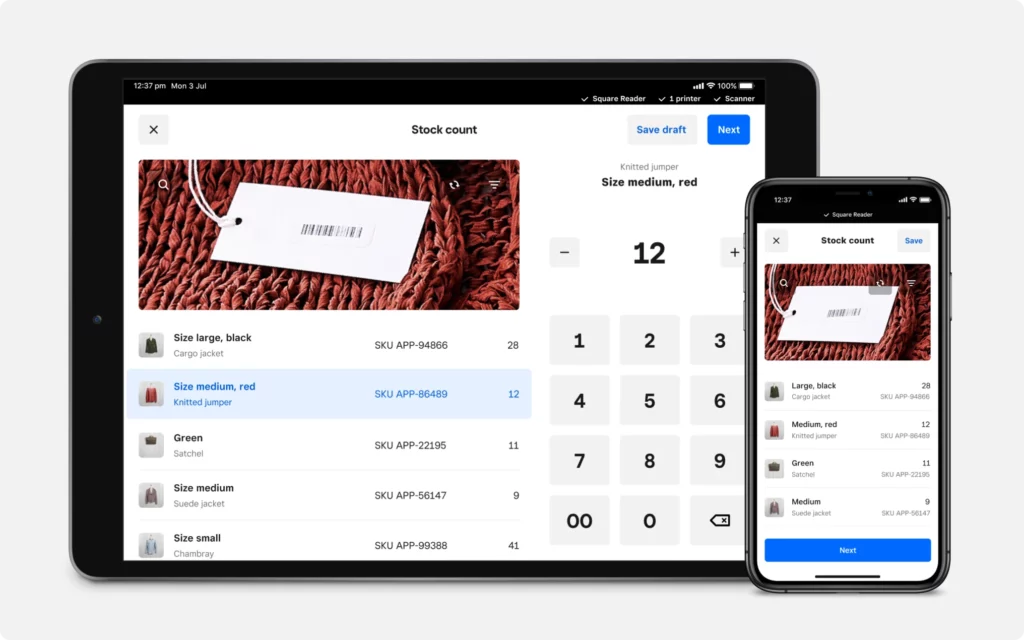
Square’s Point of Sale software is an all-encompassing solution that perfectly suits small businesses’ needs, combining many features that streamline operations and enhance the customer experience.
At the heart of Square’s capabilities is its versatile payment processing. The platform allows businesses to accept various payment methods, including debit and credit cards and even gift cards, all at a consistent rate. This flexibility is essential for catering to different customer preferences.
Features
Ease of Use: Square POS is known for its user-friendly interface, making it easy for staff and management to use. This includes quick setup and intuitive operation, reducing training time for employees.
Integrated Payment Processing: The system allows for seamless payment processing, accepting various forms of payment such as credit/debit cards, mobile payments, and more. This integration helps in fast and secure transactions.
Inventory Management: Square POS provides robust inventory management tools. Retailers can track stock levels, set up alerts for low inventory, and manage items across multiple locations.
Sales Reporting and Analytics: The platform offers detailed sales reporting and analytics. Retailers can track sales trends, understand customer buying patterns, and make data-driven decisions to enhance business performance.
A standout feature of Square is its robust payment protection. Emphasising security, the system ensures strong fraud protection and encryption, covering disputes and safeguarding the business and its customers. This security provides peace of mind for all transactions.
Prices
| Reader | Stand | FEES |
| £16 Terminal – £149 + VAT | £99 + VAT or £17/mo for 6 months | 1.75% 2.5% POS, payment links, Square Invoices and Virtual Terminal |
One of the most praised aspects of Square is its user-friendly interface. The platform is intuitive and easy to use, requiring minimal training. This saves valuable business hours that can be better utilised elsewhere.

Unlike some competitors, such as Lightspeed, which limits the number of users on its basic plan, Square allows unlimited users. This scalability facilitates business growth and team expansion without additional constraints.
Pros
- Ease of Use
- Integrated Payment Processing:
- Inventory Management
- Multi-Location Support
Cons
- Limited functionality for complex businesses
- Transaction fees can be high
- Dependence on Internet connectivity
2. Lightspeed – Great For Food & Drink Establishments
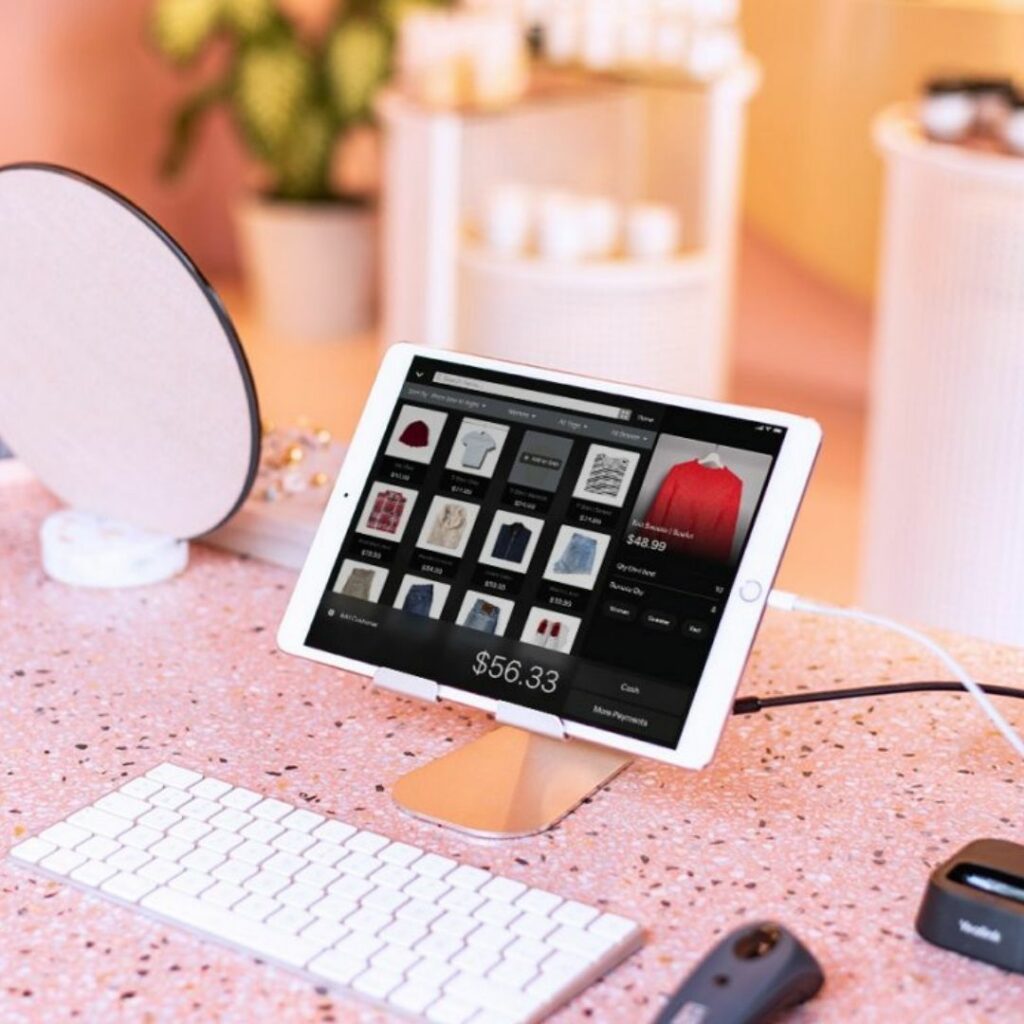
Lightspeed Restaurant is a highly adaptable, cloud-based POS system, ideal for various food establishments, from small eateries to large-scale restaurants and hotels. This software remains operational through WiFi or mobile network connections, and notably, it continues to function offline during internet downtimes.
Features
- Advanced Inventory Management: Lightspeed POS provides detailed inventory tracking and management features. It includes capabilities like product categorisation, stock level tracking, and automated reordering.
- Multi-Store Capability: For businesses with multiple locations, Lightspeed allows easy management across all stores. It helps in syncing inventory, sales, and customer data across various locations.
- Omnichannel Selling: This system supports omnichannel retail, integrating in-store and online sales. This feature enables a seamless shopping experience for customers, whether they shop online or in person.
- Customisable POS Interface: Lightspeed’s interface is highly customisable, allowing businesses to tailor the layout and features to their specific needs, which can improve efficiency at the point of sale.
- Detailed Reporting and Analytics: The platform offers comprehensive reporting and analytics tools. Retailers can gain insights into sales trends, inventory performance, and customer preferences to make informed business decisions.
An integral part of the system is Lightspeed Payments, which facilitates the acceptance of major credit cards like Visa, Mastercard, and American Express. However, this feature necessitates the purchase of a card machine through Lightspeed.
It is possible to integrate with popular food delivery platforms such as Uber Eats and Deliveroo, though it incurs extra costs.
Prices
| Pricing | Essentials | Plus |
| £39 per month | £59 (annual) or £77 (monthly) + VAT/mo for first till | £109 (annual) or £142 (monthly) + VAT/mo for first till |
Lightspeed’s subscription model is flexible, allowing free cancellation anytime, although refunds for previously paid amounts are unavailable.
Pros
- Advanced Inventory Management
- Multi-Store Capability
- Omnichannel Selling:
- Customizable POS Interface
- Detailed Reporting and Analytics
Cons
- Higher cost
- Complexity for smaller retailers
- Steeper learning curve
- Internet depends
3. Zettle by Paypal – Ideal For Small Businesses
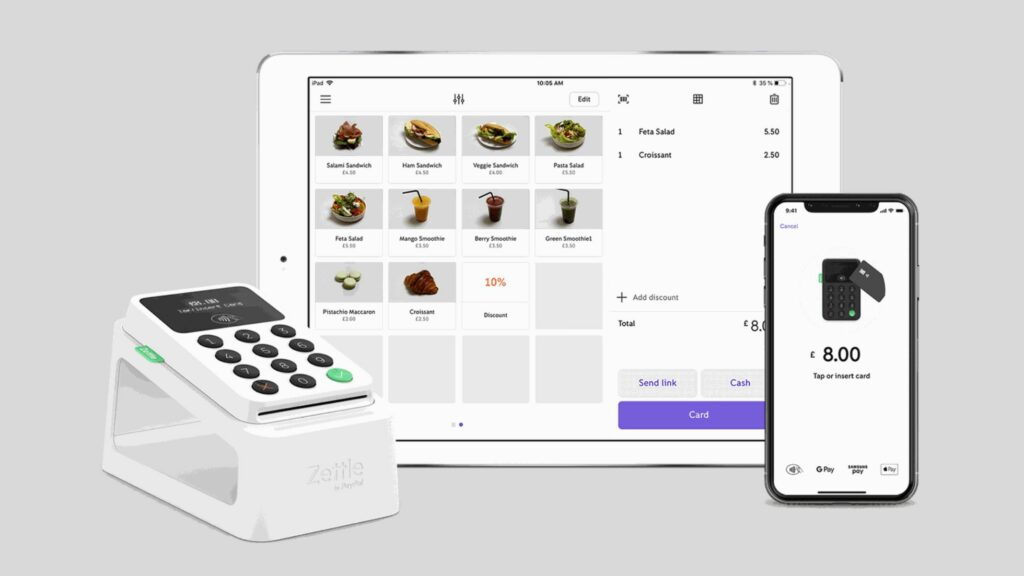
Zettle by PayPal, is an excellent choice for businesses looking for a straightforward, flexible POS app solution. Its main appeal is the ease of accepting in-person payments; all managed through the user-friendly Zettle Go app. The platform offers a free POS app, easy-to-read sales reports, and a Zettle reader that integrates well with other POS systems. Ideal for small and mobile businesses, Zettle Go is simple yet efficient, providing essential features like transaction processing and stock management. It’s intuitive, quick to set up, and, best of all, free to use. Additionally, Zettle provides handy features like low stock alerts and the option to issue gift cards, helping maintain cash flow.
Features
Mobile and Portable: Zettle is designed for mobility, offering a compact card reader that connects with smartphones or tablets, making it ideal for businesses on the go or with limited space.
Easy Setup and Use: The system is known for its straightforward setup and ease of use, requiring minimal technical knowledge.
Integrated Payment Solutions: Zettle integrates seamlessly with PayPal, offering various payment options, including credit/debit cards, contactless, and mobile payments.
Affordability: It’s generally more affordable than traditional POS systems, with competitive transaction fees and no monthly subscription for the basic version.
Real-Time Sales Tracking: Retailers can track sales in real-time, which is helpful for quick decision-making and inventory management.
Prices
| Zettle card reader | Full POS setup |
| £29 per month | From £189 |
However, Zettle has limitations, especially when compared to competitors like Square. It lacks advanced features such as a CRM system, which could impact efforts to boost sales and customer loyalty. While it’s great for startups and businesses with basic POS needs, its business and stock management tools are somewhat rudimentary, and it’s less suitable for online sellers or complex sales channels. The transaction fees for virtual payments are higher than some rivals, making it less appealing for businesses that rely heavily on online or invoice payments. Despite these drawbacks, Zettle’s transparent pricing and no monthly contract policy make it an attractive option for physical stores, particularly those processing numerous small transactions.
Pros
- Mobile and Portable
- Easy Setup and Use
- Integrated Payment Solutions
- Affordability
- Real-Time Sales Tracking
Cons
- Higher cost
- Complexity for smaller retailers
- Steeper learning curve
- Internet dependency
4. Epos Now – Good Enough For Most Retail Shops
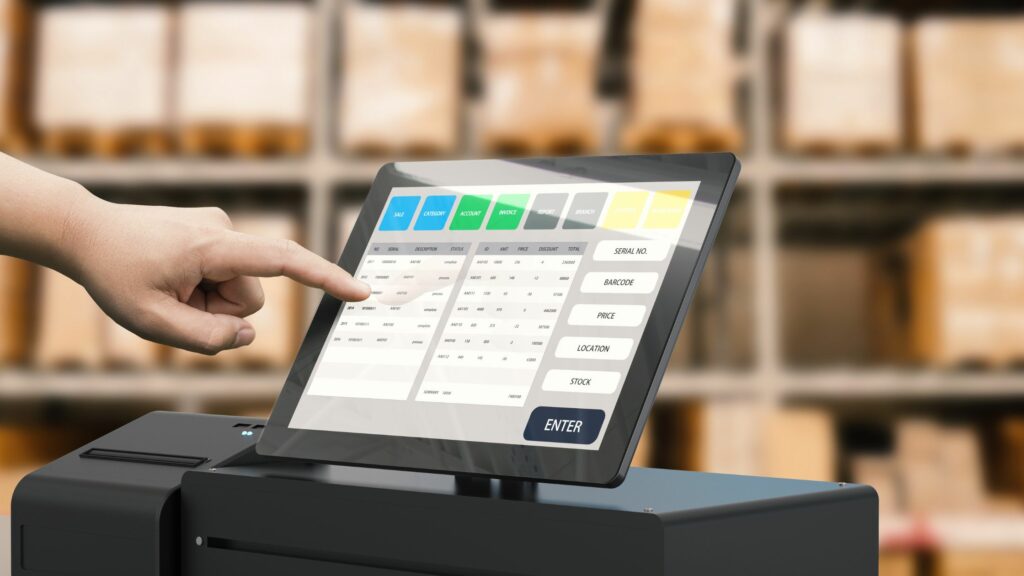
Epos Now stands out as a preferred POS solution for UK retail businesses, offering comprehensive, real-time reporting on key aspects such as staff, customers, sales, margins, and stock. The system’s ability to integrate with over 100 applications, including accounting software, CRM tools, and notably e-commerce platforms like BigCommerce, adds to its appeal. Recognised as one of the top-rated retail POS systems, Epos Now provides 24/7 customer phone support without additional charges, supports multiple store operations, and ensures a smooth one-on-one onboarding process.
Features
Versatile Hardware Options: Epos Now offers a range of hardware options, including touchscreen systems, suitable for various retail environments.
Easy Setup and Use: The system is known for its straightforward setup and ease of use, requiring minimal technical knowledge.
Robust Inventory Management: It provides advanced inventory management features, allowing for real-time tracking, automatic reordering, and detailed stock analysis.
Cloud-Based Technology: Being cloud-based, it offers remote access to sales data, inventory, and reports, enabling business management from anywhere.
Integrated Payment Processing: Epos Now integrates with various payment providers, facilitating smooth and diverse payment options for customers.
Despite these strengths, Epos Now has some limitations, particularly in CRM and loyalty tools. These features are accessible only through third-party integrations, unlike competitors like Lightspeed, which offer them at no extra cost.
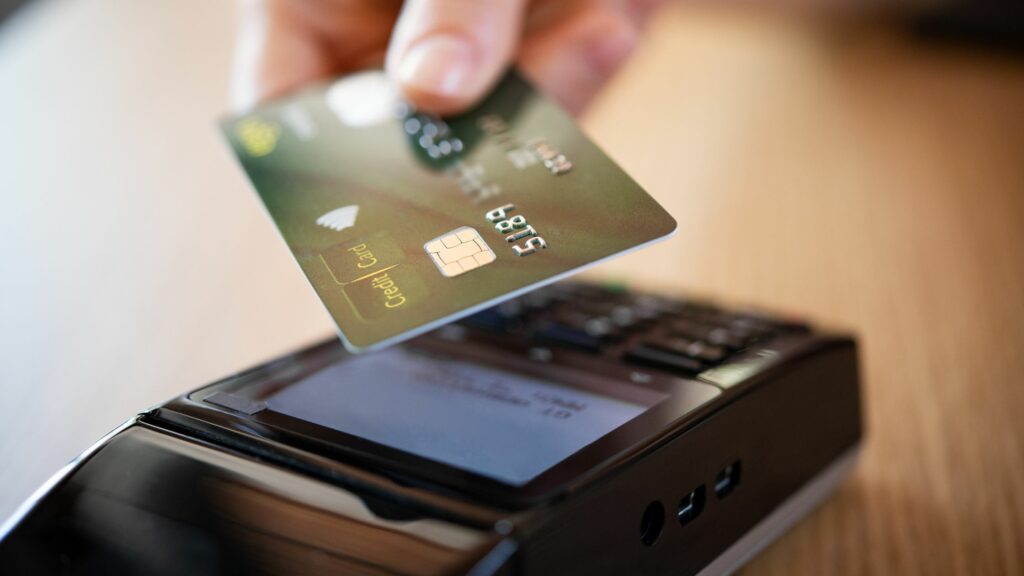
Prices
| Pricing | Transaction fees |
| £25 per month or a one-off £399 upfront payment | 2.6% + £0.10 or all transactions |
The Epos Now product range includes a mix of hardware and retail software solutions, all compatible with mobile devices. The platform is organised into industry-specific packages, such as Epos for Bars, Retail, and Hospitality, catering to the unique needs of different sectors. However, it’s noted that while the Epos range is comprehensive, the pricing plans lack transparency, which could be a drawback for potential customers.
Epos Now offers a standard package deal priced at either £25 per month or a one-off payment of £399. This package encompasses an HD Touch screen POS system, EPOS software, a secure cash drawer, a high-speed printer, and personalised onboarding and product training. While the products and services cater to both the retail and hospitality sectors, the unclear pricing plans require careful consideration from consumers to understand the cost implications fully.
Pros
- Mobile and Portable
- Easy Setup and Use
- Robust Inventory Management:
- Cloud-Based Technology:
- Integrated Payment Processing
Cons
- It can be complex for small businesses
- Higher cost for full features
- A steep learning curve for new users
- Internet dependency for cloud features
5. TouchBistro – Great POS For Hospitality

TouchBistro is a highly regarded POS solution in the UK tailored specifically for the food and beverage industry. It provides real-time, detailed reporting on various aspects crucial for restaurant management, such as sales, staff performance, menu management, and customer preferences. The system benefits restaurants, cafes, and bars, offering features that streamline day-to-day operations.
Features
User-Friendly Interface: TouchBistro is designed with an intuitive and easy-to-use interface, which benefits fast-paced restaurant environments.
Table Management and Reservation System: It provides efficient table management and reservation features, allowing restaurants to maximise seating efficiency and manage customer reservations effectively.
Menu Management: The system offers comprehensive menu management tools, enabling easy updates and customisation of the menu, including pricing, descriptions, and item modifiers.
Order Management: TouchBistro streamlines the order-taking process, reducing errors and improving customer service. It allows for easy modification and customisation of orders.
Integrated Payment Processing: The POS integrates with various payment processors, facilitating seamless transactions at the table or counter.
One of the main advantages of TouchBistro is its focus on enhancing the dining experience. This includes an intuitive table management system, efficient order processing, and seamless payment solutions, all designed to improve service quality and speed. The platform is also known for its user-friendly interface, making it easy for staff to adapt to and use effectively.
Despite its strengths, TouchBistro does have some limitations. While it offers basic CRM capabilities, more advanced features may require integration with third-party applications. This is an area where some competitors may offer more integrated solutions. However, TouchBistro compensates for this with its robust customer support, providing 24/7 assistance and a comprehensive onboarding process to help businesses get the most out of their POS system.
Prices
| Pricing | POS system | Add-ons |
| £65 per month | The TouchBistro starts at £69 per month | Reservation add-on service at £229 a month. |
TouchBistro’s hardware and software are compatible with various mobile devices, making it a flexible option for businesses of different sizes and styles. The platform caters to the specific needs of the food and beverage industry with tailored solutions, though it’s important to note that pricing details can be less transparent. Potential users should carefully consider the pricing plans, which may vary based on the range of features and services chosen.
In summary, TouchBistro is an excellent choice for those in the food service industry looking for a POS system that combines ease of use with powerful functionality to enhance operational efficiency and customer service. However, as with any POS system, it’s important to weigh its features against specific business needs, particularly regarding CRM capabilities and pricing transparency.
Pros
- User-Friendly Interface:
- Table Management and Reservation System
- Menu Management
- Order Managemen
- Integrated Payment Processing
Cons
- Limited to the food service industry
- Basic inventory features
- Limited third-party integrations
- Dependent on iOS devices
Selecting the Right POS System for Your UK Small Business: Key Factors to Consider

When selecting the best POS system for your small business in the UK, it’s crucial to compare different POS system providers thoroughly. This comparison is vital to ensure that you’re not committing to a service that, while generally excellent, may not meet the specific requirements of your business.
Key factors to consider include:
Initial Costs
Be clear about the hardware expenses you’ll face. This includes understanding the cost implications of purchasing multiple tills, card readers, or other necessary devices. Hardware costs can significantly vary depending on your business size and needs.
Transaction Fees
Transaction fees are unavoidable, but they vary between providers. These fees can significantly impact your bottom line, especially if you process a high sales volume. It’s important to balance reasonable fees and the services offered.

Mobile & iPad POS Options
For businesses that prefer minimal hardware, many providers now offer POS apps that run efficiently on iPads or mobile phones. This can be a cost-effective and flexible solution for small businesses or those operating in mobile or pop-up locations.
Online Store Integration
Choosing a POS system that integrates these two sales channels can streamline operations for businesses that handle both online and in-person sales. A unified system managing a core inventory for online and offline sales can considerably simplify business processes. Providers like Square are increasingly focusing on this integration, catering to businesses that operate across both realms.
In summary, when choosing a POS system for your UK small business, it’s essential to consider initial hardware costs, transaction fees, the option for mobile-based solutions, and the ability to integrate online and physical sales. Making an informed decision based on these factors will help you select a POS system that aligns with your business needs and contributes to its efficient operation and growth.
What To Consider For Retail Businesses?
When considering a POS system for a retail business, it’s crucial to focus on features that streamline operations and enhance customer interactions. A sophisticated inventory management system is fundamental, as retail often involves dealing with various products. This system should effectively handle different product variants, like sizes and colours, monitor stock levels, and automate reordering processes for items running low. Additionally, managing supplier details and executing stock adjustments and transfers, especially for businesses with multiple locations, is essential for maintaining inventory accuracy.
Equally important is the POS system’s capability to provide comprehensive sales reporting and analytics. This functionality should offer deep insights into various aspects of sales, including performance breakdowns by periods, product categories, and individual staff contributions. Detailed analytics are invaluable for identifying trends, such as best-selling items and peak sales hours, enabling more strategic business decisions. These insights help inventory management and play a crucial role in marketing strategies and enhancing overall customer satisfaction. In essence, the right POS system for a retail business should facilitate day-to-day transactions and act as a tool for business growth and customer relationship enhancement.
Frequently Asked Questions
How Does a POS System Enhance Retail Operations?
A POS system streamlines the sales process, making checkouts quicker and more efficient, thus improving the customer experience. It offers real-time inventory tracking to avoid stock issues, optimizes inventory management, and integrates with accounting software for easier financial management. User-friendly interfaces reduce the need for extensive training, and detailed sales analytics provide insights for data-driven business decisions.
What Are the Key Benefits of Top POS Systems in the Market?
Top POS systems in the market, such as Square, Lightspeed, Zettle, Epos Now, and TouchBistro, offer features like ease of use, advanced inventory management, integrated payment processing, multi-store capabilities, omnichannel selling, and detailed reporting and analytics. They are designed to cater to the specific needs of retail and hospitality businesses, enhancing overall operational efficiency.
What Should Retail Businesses Consider When Choosing a POS System?
Retail businesses should consider factors like initial hardware costs, transaction fees, mobile and iPad POS options, and online store integration. The POS system should handle various product variants, offer comprehensive sales reporting, and provide CRM capabilities to improve customer relationship management. It’s crucial to choose a system that aligns with the business’s specific needs for efficient operation and growth.
Are There Any Limitations to These POS Systems?
While these systems offer several advantages, they also have limitations. For instance, some may have limited functionality for complex businesses, higher costs, complexity for smaller retailers, and dependence on internet connectivity. Certain features like CRM and loyalty tools might only be available through third-party integrations, and pricing plans can sometimes lack transparency.
How Important Is Inventory Management in an EPOS System for Retail?
Inventory management is fundamental in an EPOS system for retail. It involves handling different product variants, monitoring stock levels, and automating reordering processes. Effective inventory management is essential for maintaining accuracy, making informed decisions, and ensuring customer satisfaction.
What Role Does Sales Reporting and Analytics Play in a POS System?
Sales reporting and analytics are crucial as they provide deep insights into sales performance, including breakdowns by periods, product categories, and staff contributions. These analytics are valuable for identifying sales trends and making strategic business decisions, playing a significant role in marketing strategies and enhancing customer satisfaction.
Final Words
Choosing the right POS system is critical for any retail or hospitality business looking to enhance efficiency and grow in today’s competitive market. The ideal system should streamline transactions and inventory management and provide valuable insights through sales reporting and analytics. While considering your options, consider cost, functionality, ease of use, and integration capabilities. Remember, the best POS system is one that not only meets your current needs but is also scalable to adapt to your business’s future growth and evolution. With the right POS system, you can significantly improve your operational efficiency, customer satisfaction, and overall profitability.


